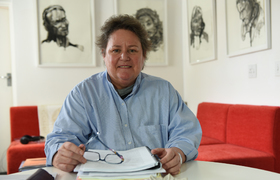National Order for UCT’s Lynette Denny
19 November 2021 | Story Helen Swingler. Photo Michael Hammond. Read time 5 min.
University of Cape Town (UCT) cervical cancer researcher Professor Lynette Denny will receive the Order of the Baobab (Silver) from President Cyril Ramaphosa at an investiture ceremony hosted by the presidency on 18 November.
Professor Denny is based in the Faculty of Health Sciences’ Department of Obstetrics and Gynaecology. The National Order recognises Denny’s work as a leading researcher in cervical cancer and its association with the human papillomavirus (HPV).
National Orders are the highest awards that the country bestows on citizens and eminent foreign nationals who have contributed towards the advancement of democracy and have made a significant impact on improving the lives of South Africans. The awards also recognise the contributions of individuals towards building a non-racial, non-sexist, democratic and prosperous South Africa, as envisaged in the Constitution.
Leading researcher
Although Denny has been the recipient of many awards, including the 2006 Department of Science and Technology Award for Women in Science in the category Distinguished Scientist Award, receiving a National Order is particularly memorable.
“This rates very highly, as it is recognition from my own beloved country, and really honours my many patients and my colleagues and teams who have supported and inspired me throughout my journey,” said Denny.
Cervical cancer is the fourth-most common cancer globally in women – the most common being breast cancer, followed by lung cancer, colorectal cancer and cervical cancer.
The countries most commonly affected by cervical cancer are in sub-Saharan Africa, Melanesia, Asia and South-east Asia. Worldwide, over 600 000 new cases of cervical cancer are diagnosed and over 300 000 deaths from cervical cancer recorded annually.
“In SA, there are over 10 000 new cases of cervical cancer diagnosed with approximately 5 000 deaths per year.”
But in South Africa, the statistics are shaped by inequity.
“In SA, there are over 10 000 new cases of cervical cancer diagnosed with approximately 5 000 deaths per year,” Denny explained. “The Age Standardised Incidence rate of cervical cancer among white women in South Africa is about 10 cases per 100 000 and over 30 cases per 100 000 black African women, reflecting the great inequality in access to preventative health services for black African women.”
Alternatives to Pap test
Denny has been involved in community-based research since 1995; a quest dedicated to innovative, accessible, safe and effective methods of preventing cervical cancer.
Historically, cervical cancer was rendered a rare disease in northern and well-resourced countries after the widespread introduction of the Pap smear, a screening procedure for cervical cancer, said Denny.
“[This test] is a real public health triumph where correctly implemented. This, however, did not extend to low- and middle-income countries where the logistics, infrastructure, human and financial resources were insufficient to support national cervical cancer prevention programmes.”
Denny and her team began exploring alternatives to the Pap smear in 1995, in collaboration with colleagues at Columbia University, New York.
“This collaboration is ongoing; and [up until] today we have screened between 50 000 and 60 000 women aged 30 years and older residing in Khayelitsha. We have written numerous scientific articles and introduced our conceptual and practical intervention to colleagues all over the world.”
Success of HPV vaccine
Two million schoolgirls in South Africa have already received the HPV vaccine, and Denny attributes much of this success to sound communication and collaboration.
“We must maintain and sustain our HPV vaccination efforts, publish regular data, form strong partnerships and empower our young girls and the women in their lives.”
“Implementing HPV vaccination in this country was a function of collaboration between politicians [and] the Departments of Health, Education and Social Development. Excellent messaging programmes were developed, and there was widespread investment in raising awareness. Of the over 400 000 girls in Grade 4 who were given their first dose of HPV vaccine in 2014, only 10 cases of adverse events were reported, and all were minor.”
And although the national health focus is on the COVID-19 vaccination programme, it’s essential to continue that momentum, Denny said.
“We must maintain and sustain our HPV vaccination efforts, publish regular data, form strong partnerships and empower our young girls and the women in their lives to come together to prevent HPV-associated disease.”
Denny has paid tribute to her team and collaborators.
“All good work will shine when it is collaborative, team-based, inclusive and designed to empower women and girls to prioritise their health. I think awards such as this are inspiring to all of us to give our best to our country.”
 This work is licensed under a Creative Commons Attribution-NoDerivatives 4.0 International License.
This work is licensed under a Creative Commons Attribution-NoDerivatives 4.0 International License.
Please view the republishing articles page for more information.










